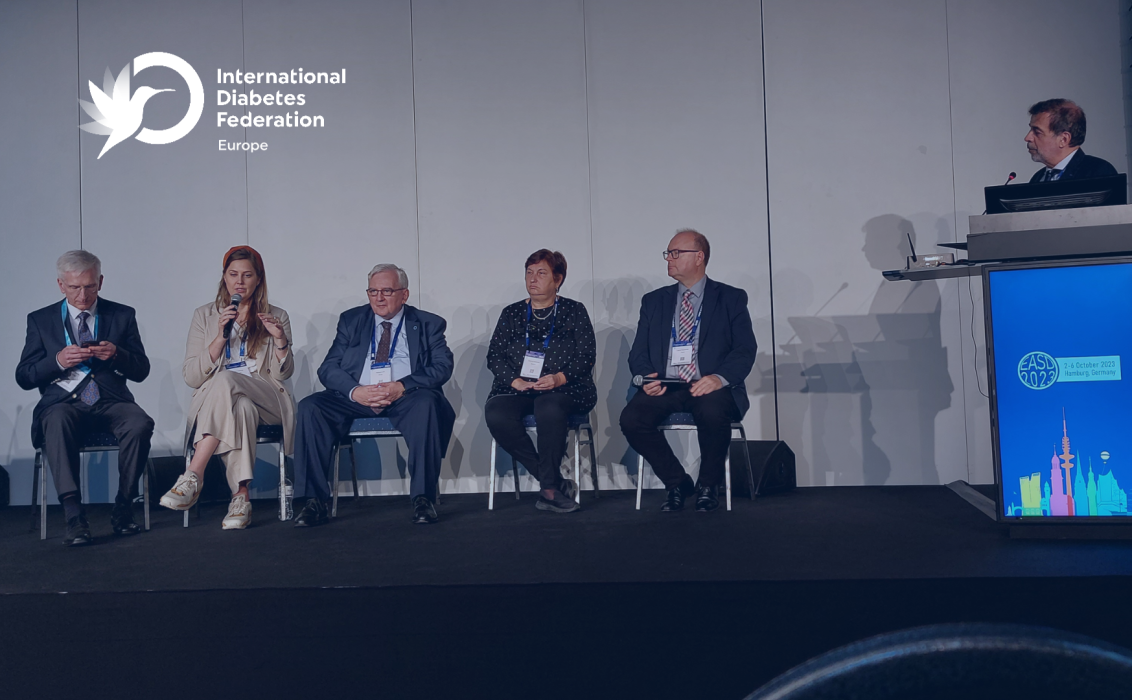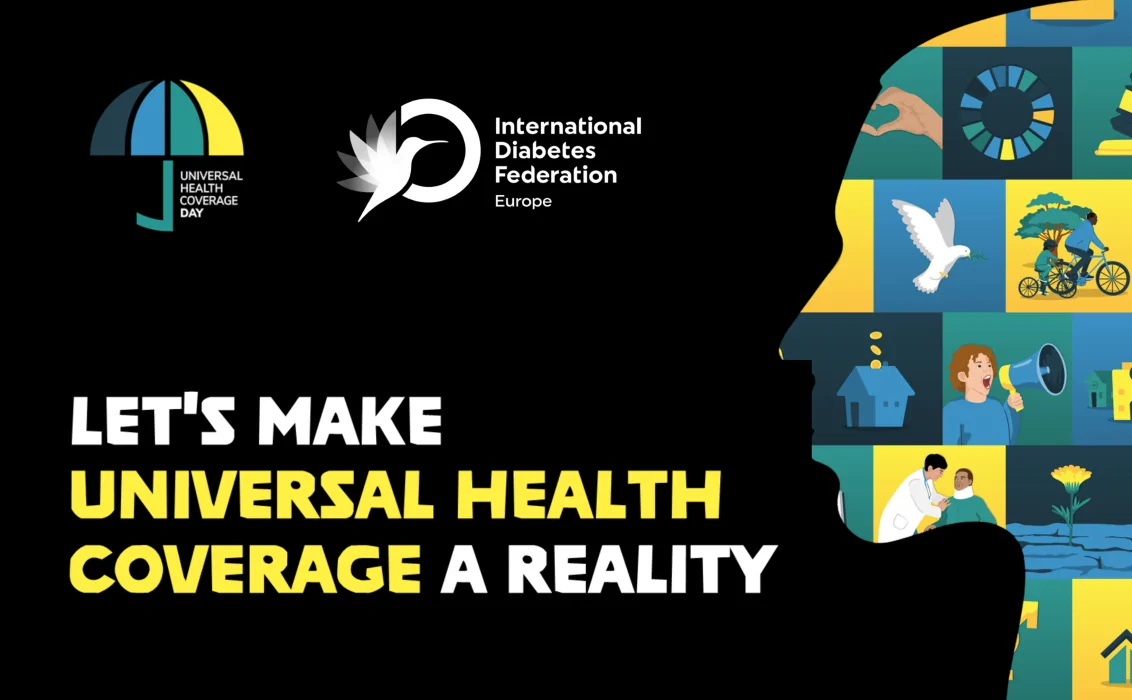From October 2-6, IDF Europe attended the European Association for the Study of Diabetes (EASD) 59th Annual Meeting, in Hamburg, where we also held a symposium, “Erase Diabetes Together”.
Each year, the conference represents an incredible opportunity to meet with our member associations, including people living with diabetes (PwD) and healthcare professionals (HCPs), members of our YOURAH Network, diabetes experts, our corporate and alliance partners and other health-related pan-European organisations. By connecting with a wide range of diabetes stakeholders and participating in conference sessions, we learned about the latest developments in diabetes prevention, management and care and we exchanged views and best practices on PwD engagement and empowerment to support their inclusions in research and advocacy activities.
The IDF Europe booth was located in the Community Plaza among those of our Member Associations with whom we had the chance to discuss upcoming events and several engagement opportunities. This also gave us the opportunity to hear about the inspiring initiatives that our Member Associations are implementing in their respective countries to reduce inequalities in access to diabetes care.
“The Turkish Diabetes Foundation (Türkiye Diyabet Vakfı) has been part of the Associations’ Village at EASD Annual Meetings since its inception. It is undeniable that we need to overcome the burden of diabetes. To achieve this, we need close collaboration and interaction with PwD and HCP associations. EASD Annual Meetings, as some of the leading diabetes-related events worldwide, represent an excellent opportunity to foster such collaborations.” – Prof. Dr. Şehnaz Karadeniz, Board Member of the Turkish Diabetes Foundation
IDF Europe Board Members were actively engaged throughout the conference and participated on various panels addressing topics such as the prevention and management of cardiovascular disease in people living with type 2 diabetes (T2D); the role of connected technologies and AI in diabetes management and care; and the role of diabetes education in preventing complications and improving health outcomes.


IDF Europe symposium: Erase Diabetes Together
On October 5, we held our symposium on how to mobilise PwD, HCPs and policy makers to lower the risk of diabetes and its complications. The event was chaired and moderated by our Board Member, Prof. João Raposo, Medical Director, Portuguese Diabetes Association (APDP) and gathered speakers representing the perspective of various diabetes stakeholders, including diabetes advocates Cajsa Lindberg and Katerina Stankova, IDF Europe Chair, Prof. Nebojša Lalić and IDF Europe Board Members, Prof. Leszek Cupryniak and Prof. Tadej Battelino. Dr. Gauden Galea, WHO Europe Strategic Adviser to the Regional Director, Special Initiative on NCDs and Innovation, joined the event remotely and highlighted WHO Europe’s perspective and initiatives to address diabetes and other NCDs.
Prof. Nebojša Lalić opened the series of presentations by illustrating how mobilising all diabetes stakeholders is at the core of IDF Europe’s strategy.
T2D advocate, Katerina Stankova, showcased the burden that T2D places on societies and in particular on people living with the condition who face numerous challenges in dealing with its psychological and financial burden as well as with the stigma associated with it.
Type 1 diabetes (T1D) advocate, Cajsa Lindberg, highlighted the fact that “If we truly want to Erase Diabetes Together, we need to acknowledge that PwD are experts in their own rights. The expertise they bring to the table is no less valuable than that of other diabetes stakeholders. The involvement of PwD in the design, planning, implementation and evaluation of policies, healthcare systems and services, new innovations and research can help increase their relevance.”
Prof. Leszek Cupryniak addressed the importance of unifying the voice of, and strengthening collaboration between, PwD and HCP associations as well as establishing mutual trust with policy makers and other diabetes stakeholders. He also stressed the need to improve collaboration and coordination between specialists and general practitioners, as the majority of T2D care is provided at the primary care level.
Prof. Tadej Battelino, representing the researcher’s perspective, explained why it is crucial to mobilise policies and funding that can support research focusing on the current unmet needs of PwD. He then highlighted that PwD should be involved at all stages of research and development to ensure that their needs and perspectives are fully represented. Prof. Battelino concluded with an overview of the role of technology in connected diabetes care and how it can improve PwD’s health outcomes and quality of life.
In his video message, Dr. Gauden Galea recalled recent global commitments and initiatives aimed at tackling the rise in the number of people living with diabetes and developing diabetes-related complications. He welcomed the upcoming High-Level Technical Summit on diabetes organised by IDF Europe, in collaboration with WHO Europe, as an opportunity to elevate diabetes on the political agenda and accelerate action to deliver on existing commitments.
During the panel discussion, diabetes advocates, Cajsa Lindberg and Katerina Stankova, addressed the importance of breaking down the barriers that are preventing people living with all types of diabetes from fully engaging in their own care and in advocacy activities. Empowering all PwD is necessary to make their voice heard and reduce inequalities in diabetes care between and within countries. As Katerina Stankova reiterated, this is particularly crucial for people living with T2D:
“The blame associated with T2D often prevents us from asking questions and from making our voice heard. When we communicate about our condition, we need to feel supported rather than blamed.”
Prof. João Raposo closed the symposium by presenting key values and principles for collaborating with all stakeholders to Erase Diabetes Together.
We look forward to attending next year’s EASD Annual Meeting in Madrid and to continuing engaging with our members and the diabetes community at large over the coming months as part of the celebrations for World Diabetes Day.











